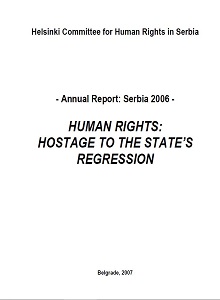Human Rights: Hostage to the State's Regression : annual report: Serbia 2006
Human Rights: Hostage to the State's Regression : annual report: Serbia 2006
Author(s): Author Not Specified
Subject(s): Human Rights and Humanitarian Law, EU-Approach / EU-Accession / EU-Development, EU-Legislation
Published by: Helsinški odbor za ljudska prava u Srbiji
Keywords: Deinstitutionalization; Transitional Justice; European Integration; Nationalism; Human Rights
Summary/Abstract: All segments of Serbia’s political, economic and social life stagnated in 2006. Serbia’s overall situation is rather to be ascribed to the fact that her institutions have been devastated and her social tissue destroyed over the past 20 years. This major dimension of Serbia’s reality was neither appreciated nor objectively assessed at the time of Slobodan Milosevic’s ouster. Besides, the criminal legacy of the 1990s wars that nowadays hinder the society’s democratic transition and facing the recent past was disregarded. All this resulted in self-isolation and fueled the concept of “a neutral” Serbia with reliance on Russia. Today’s concept of transitional justice has been exhausted when it comes to present-day Serbia and her poor potential. Objective limitations also condition Serbia’s movement towards European integrations, the European Union in the first place. As a failed transitional country facing numerous demands, Serbia is incapable of meeting European standards and criteria. Her new political and financial class (tycoons) would not let go yet the positions acquired over the past 20 years. As it turned out, pressures and the policy of conditioning are no longer effective in Serbia’s case as her political elite is not truly willing to join Europe but ready to sacrifice Serbia’s future place in it instead. Serbia was totally deinstitutionalized in early 2007 after the parliamentary election. In spite of the clear-cut electoral outcome and popular vote, the lowest-ranking of the three leading political parties, the Democratic Party of Serbia – presently without legality and legitimacy – still holds the reins of political and social developments with the support of informal centers of power. This at the same time testifies that Serbia functions as a “façade democracy.”
- Print-ISBN-13: 978-86-7208-138-1
- Page Count: 532
- Publication Year: 2007
- Language: English
- eBook-PDF
- Table of Content
- Introduction

